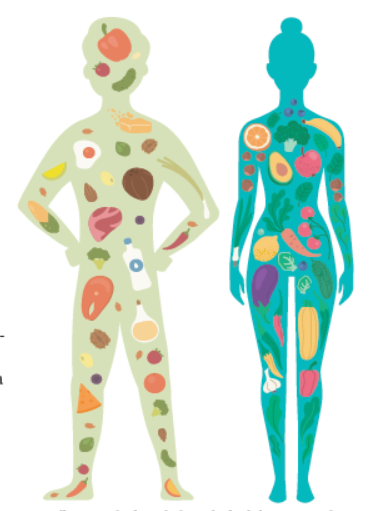We all want smooth, healthy skin. There is a huge market for skincare products, but the best way to care for our largest organ is the same way we care for all of our organs—by following a healthy diet. The fact is, what we put on our plate—as well as what we don’t—can have a significant impact on our skin.
“The things we take into our body play a role in collagen production, wound healing, and helping promote cell turnover,” says dermatologist Farah Moustafa, MD. “Foods also provide antioxidants that help against photo-aging, wrinkles, and even skin cancer.” Here’s a look at what foods and nutrients may—or may not—impact skin health:
Fruits and Vegetables—GOOD
“Good vitamin C intake promotes healthy skin,” says Moustafa. “This vitamin is important for collagen (a key structural protein in the skin), helps mop up free radicals, and protects the skin against oxidative damage related to ultraviolet light exposure and pollution.” Though vitamin C deficiency is uncommon, it can lead to fragile skin that bruises easily, slow wound healing, and bleeding gums.
Common foods high in vitamin C include strawberries, kiwis, bell peppers, oranges, broccoli, and tomatoes.
Nuts and Seeds—GOOD
Over the years, oxidative damage to proteins in the skin can lead to changes in skin structure, which we see as photodamage and wrinkling. Nuts and seeds are dietary sources of vitamin E, which, like vitamin C, is an antioxidant that helps prevent oxidative damage in the body, including the skin. As with vitamin C, Moustafa and other experts recommend nourishing the skin from the inside out, by getting vitamin E and other nutrients through foods. Swapping in nuts and seeds, plant oils, spinach and other leafy green vegetables, avocados, and whole grains will boost intake of vitamin E.
Fish—LIKELY GOOD
Fish—especially cold-water fish like salmon, mackerel, tuna, and sardines—are rich in omega-3 fatty acids referred to as DHA and EPA. These unsaturated fatty acids play an anti-inflammatory role in the body, which can benefit the skin by helping with conditions such as psoriasis and eczema. The body doesn’t produce these fatty acids, so we need to get them from foods like fish, nuts and seeds (like flaxseed, chia seeds and walnuts), and plant oils (soybean and canola oils).
Red Meat—LIKELY BAD
Although scientific evidence is limited, it has been proposed that consumption of certain foods may promote inflammation in the body and worsen inflammatory skin disorders like acne, eczema, psoriasis, and rosacea. According to the National Psoriasis Foundation, foods that are associated with skin inflammation include fatty red meats. “Excessive intake of fatty cuts of red meat can lead to too much arachidonic acid, which has breakdown products that can trigger psoriasis,” says Moustafa.
Replacing some (or all) of the red meat in your diet with plant proteins (legumes, nuts, nut butters), seafood, and poultry has known heart-health benefits, and may help keep your skin clear as well.
While nutrients like vitamins C and E and essential fatty acids are widely used in skincare products and oral supplements, the best way to get these nutrients is through foods. “Topicals such as vitamin C serums have variable concentrations, stability, and efficacy,” says Moustafa. “It is important to get adequate amounts of the necessary nutrients for skin health through a balanced diet. Oral supplementation is valuable for people who have an absorptive issue, medical condition, or some other reason for chronically low levels of key nutrients,” she explains.
To keep your skin supplied with plenty of antioxidants and support skin cells and collagen, aim for a dietary pattern rich in fruits, nuts and seeds, non-tropical plant oils, vegetables, whole grains, and cold-water fish, like a Mediterranean style eating pattern. To feel as good as you look, be sure to eat these foods in place of less nutritious choices, such as fatty cuts of meat and packaged foods high in refined grains, added sugars, and sodium.
A healthy diet is good for your skin. Try these tips:
- Nourish from the inside out. Get nutrients from foods first, rather than supplements, creams, and ointments.
- Replace unhealthy foods with healthy choices. Replacing foods high in refined grains, added sugars, sodium, and saturated fats with fruits, nuts/seeds, non-tropical plant oils, vegetables, legumes, whole grains, and fish/seafood ensures plenty of nutrients that support healthy skin (and overall health as well).

























It would be far better if Tufts noted how much nuts and berries we should average a day :
2 oz walnuts ?
3 oz mixed berries ?
What ?
How much liquid ? Water ?
Thank you,
michael001066@gmail.com
This article is rich in concise advice for getting essential nutrients through foods available each and every day. In addition, because of our environmental toxins which may contribute to cancer, many foods described are also rich in phytonutrients which can prevent oxidative changes to otherwise healthy tissues that may trigger cellular damage and subsequent cancers. There are also benefits to redesigning one’s diet for weight management. In a three year period, I have been able to lose 50 pounds by increasing the frequency of a fish (salmon) and salad primary meal in evenings. Weight control, increased energy and improved mood are all a product of improved choices that were cited in this article. Comments by a 71 year old male who feels like 50!!
Dear Staff/Faculty:
A question regarding skin cancer: from prestigious journals in the field, I understand that vitamin B3 [nicotinamide] HAS been demonstrated (if only mildly) to lessen the risk for NONmelanoma skin cancer; yet, I have also read that vitamin B3 [niacin] is associated with cardiovascular issues. Having had B.C.C. in my one ear this year (male; age 67; no hereditary skin cancer), I wonder if I should take this vitamin B3 supplement OR consume foods high in this nutrient.
Respectfully,
Laurence Alter